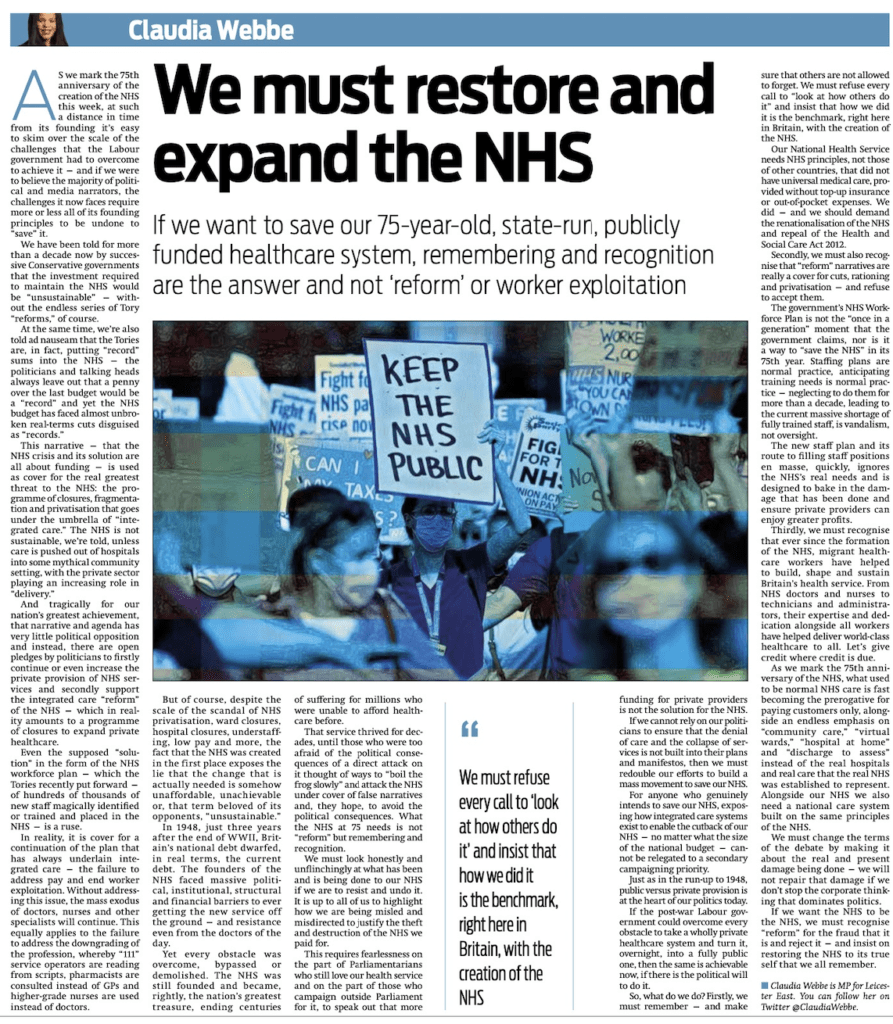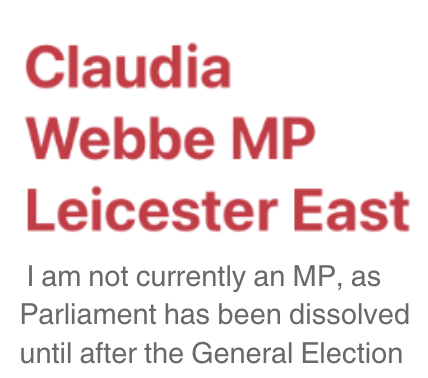
We must restore and expand the NHS
By Claudia Webbe MP
If we want to save our 75-year-old state-run healthcare system, remembering and recognition are the answer and not ‘reform’ or worker exploitation, writes CLAUDIA WEBBE MP
AS we mark the 75th anniversary of the creation of the NHS this week, at such a distance in time from its founding it’s easy to skim over the scale of the challenges that the Labour government had to overcome to achieve it — and if we were to believe the majority of political and media narrators, the challenges it now faces require more or less all of its founding principles to be undone to “save” it.
We have been told for more than a decade now by successive Conservative governments that the investment required to maintain the NHS would be “unsustainable” — without the endless series of Tory “reforms,” of course.
At the same time, we’re also told ad nauseam that the Tories are, in fact, putting “record” sums into the NHS — the politicians and talking heads always leave out that a penny over the last budget would be a “record” and yet the NHS budget has faced almost unbroken real-terms cuts disguised as “records.”
This narrative — that the NHS crisis and its solution are all about funding — is used as cover for the real greatest threat to the NHS: the programme of closures, fragmentation and privatisation that goes under the umbrella of “integrated care.” The NHS is not sustainable, we’re told, unless care is pushed out of hospitals into some mythical community setting, with the private sector playing an increasing role in “delivery.”
And tragically for our nation’s greatest achievement, that narrative and agenda has very little political opposition and instead, there are open pledges by politicians to firstly continue or even increase the private provision of NHS services and secondly support the integrated care “reform” of the NHS — which in reality amounts to a programme of closures to expand private healthcare.
Even the supposed “solution” in the form of the NHS workforce plan — which the Tories recently put forward — of hundreds of thousands of new staff magically identified or trained and placed in the NHS — is a ruse.
In reality, it is cover for a continuation of the plan that has always underlain integrated care — the failure to address pay and end worker exploitation. Without addressing this issue, the mass exodus of doctors, nurses and other specialists will continue. This equally applies to the failure to address the downgrading of the profession, whereby “111” service operators are reading from scripts, pharmacists are consulted instead of GPs and higher-grade nurses are used instead of doctors.
But of course, despite the scale of the scandal of NHS privatisation, ward closures, hospital closures, understaffing, low pay and more, the fact that the NHS was created in the first place exposes the lie that the change that is actually needed is somehow unaffordable, unachievable or, that term beloved of its opponents, “unsustainable.”
In 1948, just three years after the end of WWII, Britain’s national debt dwarfed, in real terms, the current debt. The founders of the NHS faced massive political, institutional, structural and financial barriers to ever getting the new service off the ground — and resistance even from the doctors of the day.
Yet every obstacle was overcome, bypassed or demolished. The NHS was still founded and became, rightly, the nation’s greatest treasure, ending centuries of suffering for millions who were unable to afford healthcare before.
That service thrived for decades, until those who were too afraid of the political consequences of a direct attack on it thought of ways to “boil the frog slowly” and attack the NHS under cover of false narratives and, they hope, to avoid the political consequences. What the NHS at 75 needs is not “reform” but remembering and recognition.
We must look honestly and unflinchingly at what has been and is being done to our NHS if we are to resist and undo it. It is up to all of us to highlight how we are being misled and misdirected to justify the theft and destruction of the NHS we paid for.
This requires fearlessness on the part of Parliamentarians who still love our health service and on the part of those who campaign outside Parliament for it, to speak out that more funding for private providers is not the solution for the NHS.
If we cannot rely on our politicians to ensure that the denial of care and the collapse of services is not built into their plans and manifestos, then we must redouble our efforts to build a mass movement to save our NHS.
For anyone who genuinely intends to save our NHS, exposing how integrated care systems exist to enable the cutback of our NHS — no matter what the size of the national budget — cannot be relegated to a secondary campaigning priority.
Just as in the run-up to 1948, public versus private provision is at the heart of our politics today.
If the post-war Labour government could overcome every obstacle to take a wholly private healthcare system and turn it, overnight, into a fully public one, then the same is achievable now, if there is the political will to do it.
So, what do we do? Firstly, we must remember — and make sure that others are not allowed to forget. We must refuse every call to “look at how others do it” and insist that how we did it is the benchmark, right here in Britain, with the creation of the NHS.
Our National Health Service needs NHS principles, not those of other countries, that did not have universal medical care, provided without top-up insurance or out-of-pocket expenses. We did — and we should demand the renationalisation of the NHS and repeal of the Health and Social Care Act 2012.
Secondly, we must also recognise that “reform” narratives are really a cover for cuts, rationing and privatisation — and refuse to accept them.
The government’s NHS Workforce Plan is not the “once in a generation” moment that the government claims, nor is it a way to “save the NHS” in its 75th year. Staffing plans are normal practice, anticipating training needs is normal practice — neglecting to do them for more than a decade, leading to the current massive shortage of fully trained staff, is vandalism, not oversight.
The new staff plan and its route to filling staff positions en masse, quickly, ignores the NHS’s real needs and is designed to bake in the damage that has been done and ensure private providers can enjoy greater profits.
Thirdly, we must recognise that ever since the formation of the NHS, migrant healthcare workers have helped to build, shape and sustain Britain’s health service. From NHS doctors and nurses to technicians and administrators, their expertise and dedication alongside all workers have helped deliver world-class healthcare to all. Let’s give credit where credit is due.
As we mark the 75th anniversary of the NHS, what used to be normal NHS care is fast becoming the prerogative for paying customers only, alongside an endless emphasis on “community care,” “virtual wards,” “hospital at home” and “discharge to assess” instead of the real hospitals and real care that the real NHS was established to represent. Alongside our NHS we also need a national care system built on the same principles of the NHS.
We must change the terms of the debate by making it about the real and present damage being done — we will not repair that damage if we don’t stop the corporate thinking that dominates politics.
If we want the NHS to be the NHS, we must recognise “reform” for the fraud that it is and reject it — and insist on restoring the NHS to its true self that we all remember.
Claudia Webbe MP is the member of Parliament for Leicester East. You can follow her at www.facebook.com/claudiaforLE and twitter.com/ClaudiaWebbe


